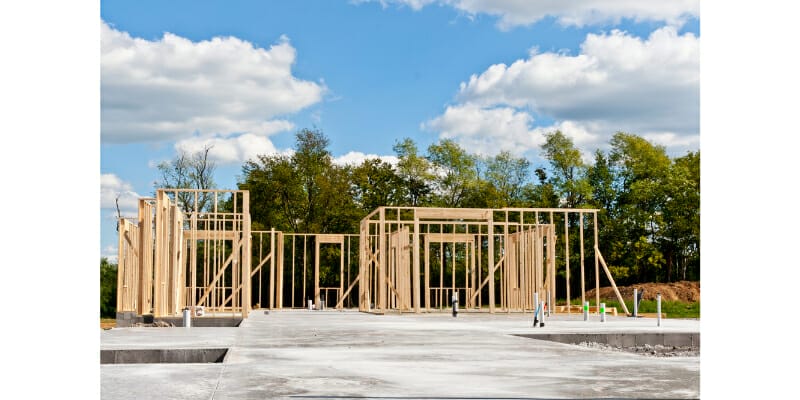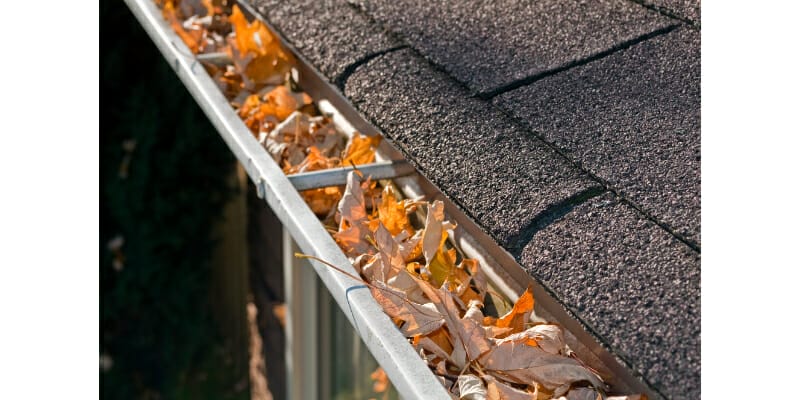Disclaimer: This post may contain affiliate links, meaning we get a small commission if you make a purchase through our links, at no cost to you. For more information, please visit our Disclaimer Page.
Slab homes are a popular building style for many people and gutters are necessary for many types of homes, but does that apply to slab homes?
Slab homes need gutters as they are also vulnerable to water damage. Without a proper rain gutter system, heavy rainfall and the subsequent moisture will lead to crack formation, mold infestation, soil erosion, etc.

Table of Contents
Why Do Homes Need Gutter Systems?
Gutters and downspouts are common in many homes yet it is easy to overlook them. Particularly during the dry season, you might think gutters are more of a hassle than a necessity. But there are several reasons why home experts, roofers, and builders will advise you to invest in this system.
The most important task the gutters do is protecting your house’s foundation from water and moisture. If rainwater or the water from melted snow starts to create puddles around the foundation, the moisture slowly wears down the foundation.
Over time, the foundation starts cracking up, which lets more water get in. This causes even faster deterioration.
So, the gutters collect the water from the rooftop and pour it into the downspouts. Then the downspout carries the water to a safe distance away from your house.
Another part of your home the gutters will protect is the basement. Flooding is a common occurrence in homes that do not have a good gutter system. Because the water around the house slowly seeps into the basement through the walls.
With moisture also comes molds and other types of fungus as they love to grow on a wet surface. If the walls on your house become wet repeatedly, the water will damage the paint and eventually cause it to rot. Gutters help to minimize the contact of water to your walls during and after a rainstorm.
Soil erosion is another concern if your house does not have proper rainwater management. Water makes the ground softer and less stable. If the water continuously builds up around the foundation, the ground beneath and surrounding it will start to give away.
This can lead to uneven flooring and even increase the risk of a potential collapse.
For all these reasons, gutters and downspouts are a vital part of any proper home.
Why Are Some Homes Built Without Gutters?
Now, after everything we mentioned about the importance of gutters, you may be confused as to why some houses still do not feature any such system. Well, there are a few notable reasons for this.
First of all, the primary role of guttering systems is to carry away rainwater. So, in an arid climate, you may not see gutters as often. Because it does not rain much in those areas. So, both the construction company and the homeowner may feel like a gutter system is arbitrary in such conditions.
This is why you will see many houses in places like Arizona or Utah that will not feature any sort of gutters or downspouts. In these regions, people experience rain for a limited period. This level of rainfall may not be enough to cause foundation damage.
So, the owners choose to weather the storms and then not think about it.
If the house is on a slope that carries the water away from the house naturally, gutters may not seem as crucial. Also, if the roofs have very long overhangs, it may be a deterring factor. Because a long enough overhang will not allow water to pile up right next to the foundation.
Monetary interest and physical labor can also play a role in this. After all, gutters do require regular maintenance, which can cost you extra cash. This is especially true when the gutters are of poor quality and break easily.
Then you end up paying for new pipes or have to call in a professional to fix it for you.
Hence, some homeowners may think that gutters are not worth the hassle and labor. Or perhaps the construction crew decides against installing gutters as a way of lessening the workload.
So, if you see a home without a proper guttering system, any combination of the causes above will probably explain it.
Do Slab Homes Need Gutters?
Slab homes get their names from the concrete slabs that serve as the foundation to these buildings. These slabs are typically 4 to 6 inches thick in the center and square in shape. This slab sits on top of the ground and the rest of the house is constructed on top of it.
Since the slab is completely solid, there is no space for a crawlspace or basement. This is a major distinguishing feature of slab homes. This may prompt some to think that slabs do not need gutters as there is no basement to protect.
But in reality, slab homes are just as likely to develop water damage as homes with a basement. This is because moisture can and will wear down concrete over time. And if the integrity of the home’s foundation is in danger, then so are you and your family. So, regardless of what the foundation is made of, constant exposure to rain and moisture will weaken it.
Plus, the slab is still surrounded by regular ground. And if you let water accumulate in the vicinity of the foundation, it can lead to soil erosion. Even a solid stone base will start to get uneven when this occurs.
Furthermore, your wall is likely the same as the walls on houses with a basement. And we have already discussed how not having a gutter can damage the walls and lead to molds.
Rainwater is also a problem for your lawn or patio. Without gutters collecting the water, you’re going to get wet just by standing close to the edge of your house. Your porch is going to stay soggy and wet long after the shower stops.
Even if you happen to live in arid areas, gutters can still be important. Yes, the annual rainfall is low. But if that puddle sits there for days on end, it can start the slow process of corrosion. And every year after that, the foundation breaks down at a steady pace.

Is There an Alternative to Traditional Gutters for Slab Homes?
Now you know that a rainwater management system is necessary for any house. But for people looking to venture away from traditional gutters, there are a few interesting options available.
These systems can be as effective as regular gutters and downspouts but offer a distinct aesthetic. So, let’s talk about some of them.
Rain Chains
Gutters are the traditional rainwater disposal system in the west. But in Japan, the people traditionally use rain chains.
These aesthetically pleasing drainage systems collect the water and channel it through a string of cups. Usually, this water goes directly into the Underground pipeline and away from the foundation. But over the ground rain chains also exist.
French Gutters
These are a more discreet alternative to standard gutters. Instead of a long downspout funneling the water, you set the gutter in the spot where the water drops.
Once again, the waters are taken underground to the pipelines or other drainage systems.
Copper Gutters
They sound like regular gutters but are more ornate and efficient. In certain home designs, these gutters can mesh extremely well.
Rainhandler
A modern take on the rain dispersal system, the rainhandler is a low-profile, efficient method for keeping rainwater away. It disperses the rushing water into small drops that hit the ground with less force.
The water also lands away from your walls and foundation, thus protecting from corrosion.
Conclusion
Protecting your home from rainwater damage is essential, be it a slab home or otherwise. Now, whether you accomplish that through traditional gutters and downspouts or with one of the alternative methods is completely up to your preference.
